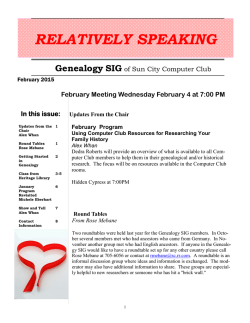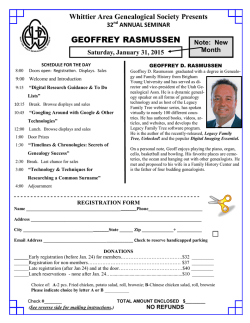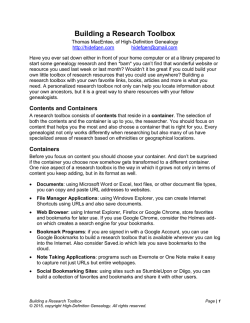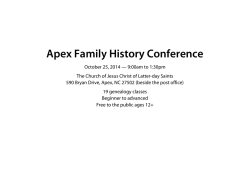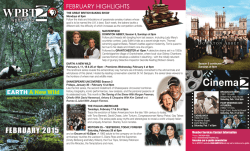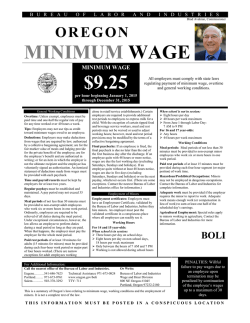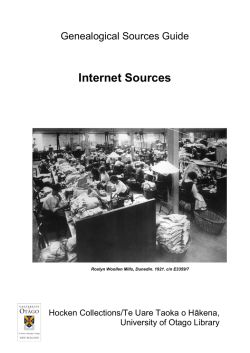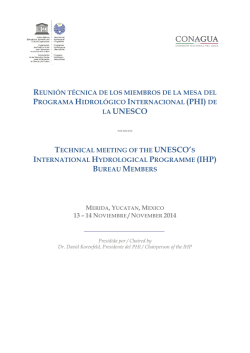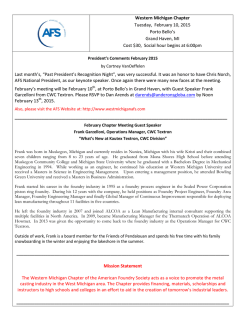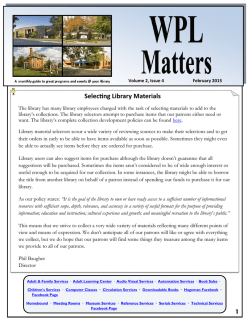
Since 1972 Vol. 15 No. 2 February 2015
Since 1972 Vol. 15 No. 2 February 2015 Thursday, February 12th TWIG TALK A publication of: Muskegon County Genealogical Society c/o Hackley Public Library Torrent House 315 W. Webster Avenue Muskegon, MI 49440-1208 www.genealogymuskegon.org [email protected] Find us on Officers President: Past President: Vice President: Secretary: Treasurer: Dawn Westcomb Kelley Jane Appleton Schapka Kathy Broughton DeCormier Karen Page Frazier Nancy Clark Spoon Committees County Clerk ................. Jane Gates Dawn Kelley Barb Martin Facebook ...................... Norman Dagen Historian ....................... Board Members History Book Project ..... Kathy DeCormier Hospitality...................... Jane Weber John Slater Phyllis Slater Library ........................... Barb Martin Membership .................. Paula Halloran Newsletter ..................... Kay Bosch Dawn Kelley Pioneer Cert. Program.. Barb Martin Programs & Publicity..... Board Members Special Projects ........... Dawn Kelley Website ......................... Shelly Nelson VFW Post 3195, 5209 Grand Haven Rd. USING EVERNOTE & WEB CLIP FOR GENEALOGY Speaker Karen Frazier You may have heard all the buzz about using Evernote for Genealogy, but wondered where to begin. Karen Frazier will present the basics of Evernote, and also review specific examples of organizing your stacks and stacks of genealogy materials, pictures, charts, books, etc. She will also show you the basics of Web Clip, and how to incorporate your clips into Evernote for storage. Karen (Page) Frazier is a Muskegon native. She earned her Bachelor’s degree from Baker College, with a major in Human Resources and minor in Psychology. She is a certified Senior Professional of Human Resources (SPHR) via the Society for Human Resource Management, and has worked in the Human Resources field over 25 years. Her work experience includes the design and classroom instruction of corporate training programs for numerous organizations. FAMILY HISTORY WORKSHOPS Saturday, February 14 10:30am – 12:30pm & 2pm – 4pm Space is limited, so please pre-register either online at [email protected] or call the Torrent House, Local History & Genealogy Dept. at 231-722-7276 ext. 240 to hold your spot. How About Some Extra Genealogical Trivia Questions This Month! Answers can be found somewhere in this newsletter. GOOD LUCK! This will be a fun one for you….. 1. What does IGI stand for? 2. Your grandfather’s sister’s daughter is your? 3. What is the standard genealogical way to write June 4, 1898? 4. What does “Intestate” mean when researching a dead ancestor? 5. Where is the best place to start your genealogical research? MEMBERSHIP COUNTY CLERK RESEARCH If you have not sent in (or brought in) your dues for 2015, please do so now. They were due in Muskegon County Building 990 Terrace December. Don’t miss anything we have coming for St. Use the front entrance on Terrace St. 2015. Renew Now! MCGS volunteers are there every HOSPITALITY HAPPENINGS Wednesday from 1:00-4:00 p.m. NEW BOOKS AT HPL The New Year signals a time for new beginnings so let's find an ancestral baby photo to share. Better still would be a grownup picture to pair with it! We are fortunate to have numerous books placed in our Local History and Genealogy area lately. Come in and take a look. A History of Michigan's Natural Resources: Agriculture Mining and Lumber, by Mark Pickvet NEW ON TV! Genealogy is becoming more popular every day. Of course we all knew it was important long before the television picked it up. Here is the latest television info: Thank you to Dennis Allen, who found and shared this website info with us! It is called “Silent Storytellers” and is on PBS on Sunday, January 4, 11:00 pm on HD/ Main Schedule Description: The cultural, artistic and personal stories cemeteries provide to their communities are explored. View Additional Airings 01/10/15, 10:00 pm Life 02/28/15, 4:00 pm HD/Main Schedule Website: http://www.aetn.org/silentstorytellers TLC (The Learning Channel) has announced the premiere date and a partial lineup for this season of the genealogy TV show. "Who Do You Think You Are?" There will be 8 episodes this year, with the premiere scheduled for Tuesdays starting on February 24th, 2015 at 10:00 p.m. The “Genealogy Roadshow” on PBS (episode lineup) January 27, 2015 at 8:00 p.m. February 3, 2015 at 8:00 p.m. February 10, 2015 at 8:00 p.m. The Shocking Story of Helmuth Schmidt: Michigan's Original Lonely Hearts Killer, by Tobin T. Buhk Death At The Lighthouse: A Grand Island Riddle, by Loren Graham Grand Traverse: The Civil War Era, by John C. Mitchell History of the Finns in Michigan by Armas K.E. Holmio Books below were donated by Clara E. Vickers. Philip and Martha: Their Sons and Daughters The Olmstead Family of Old Fairfield, Connecticut V.1 & 2, by Donald Lines Jacobus The Licking Lantern - March 2003 Goodrich Family, by Buell Burdett Bassette Witlock Old Fairfield V.2, by Donald Lines Jacobus The Newell Family of England and America, by Buell Burdett Bassette Gale Family of Salem, Mass., by Charles F. Townes The Olmstead Family of Old Fairfield, Connecticut V.2, by Donald Lines Jacobus Asahel Blodgett of Hudson & Dorchester, NH: His American Ancestors and His Descendants, compiled by Isaac Dimond Blodgett The Descendants of James Cole of Plymouth 1633, by Ernest Byron Cole Chronicle of a Border Town: History of Rye Westchester County, NY 1660-1870 Including Harrison and the White Plains Till 1788, by Charles W. Baird Thank you Fran Harrington for sharing this information below with us. Round Rounds Genealogy: Descendants of John Round of Swansea, Massachusetts Did you know about this on Ancestry.com? Apparently they have a few videos on youtube. Check it out. The Harrington Family in America Thomas Newell and His Descendants, compiled by Mary A. (Newell) Hall https://www.youtube.com/watch?v=FaxsK-EmX9I 2 Twig Talk Vol. 15, No. 2 February 2015 NEW RECORDS ONLINE INTERESTING FAMILY HISTORY BINDERS US – A new genealogy website has launched called Mapping the Freedmen’s Bureau – An Interactive Research Guide. It is designed to assist people in finding Freedmen’s Bureau records. Many of these records are online, but are scattered across the internet. This new website helps direct researchers to the available resources. The Bureau of Refugees, Freedmen and Abandoned Lands (or Freedmen’s Bureau in short) was a federal government agency set up after the end of the US Civil War to aid freed slaves. The Bureau’s job was to help solve many of the everyday issues encountered by newly freed slaves. This would include such things as obtaining clothing, food, water, health care and jobs. The Bureau generated a considerable number of records that can now be used by genealogists. The new website was created by Angela Walton-Raji and Toni Carrier. It has several interactive maps that researchers can use to determine what records are available near their area of interest. If the records are online, the map provides the appropriate links. The maps list the Freedmen’s Bureau field offices, contraband camps, Freedmen’s Bureau hospitals, Freedman’s Savings Bank branches and locations of United States Colored Troops (USCT) battles. Access is free. - http://mappingthefreedmensbureau.com/ Here is a great way to make your binders attractive, interesting, and looking like they might be worth something to future generations. Of course these are all customized for your order. They run around $20 to $30. These were all found by just doing a Google Search for “Genealogy Binders.” They vary in price and style but may give you some ideas on how you can customize your own binders if you don’t want to buy one of these. You can make your own binders in many ways too. Local craft stores and scrapbook stores have them. You could paint your family information on them or use permanent markers. Use insert sheets on the front and sides and decorate them to catch attention. US – Cartographer Dennis McClendon has created a useful website called Chicago In Maps. It provides links to online maps of Chicago found on different websites. Click on the link titled Historic Maps to view an interesting collection of historic street maps of Chicago. The value of this website is that it saves you the effort of having to search all over the internet for historic Chicago maps. Access is free. See more at http:// www.chicagoinmaps.com/ Something else to remember: You should put names, dates, and places on all of your old photos (ask older family members to help). But please use safe ink. You can get pens at the craft and scrapbook stores that you can write on the back of photos with. US – The State Library of Massachusetts has completed digitizing 8,400 images of World War I soldiers primarily from Massachusetts, with some images of soldiers from surrounding states. Many of the images are of individual soldiers and contain biographical information, as shown in the sample image below. This collection was donated to the state library in 1935 by the Boston Globe newspaper. It is a good collection to search if you had ancestors from the Northeast who were soldiers in WWI. Access is free - See more at http://archives.lib.state.ma.us/ handle/2452/124230 It is VERY important to get all photos and even filmstrips labeled before it is too late. Don’t forget to do slides as well. UK – FamilySearch has created an important image collection of United Kingdom World War I military service records. These records span the years from 1914 to 1920 and consist of some 43.5 million images. The images are arranged by last name, making it relatively easy to search for an ancestor. The images come from the National Archives. Access is free - See more at - https:// familysearch.org/search/collection/2125045 If you have old filmstrips you can go to Radium Photo or maybe Camera Shop and have them put on DVD too. International Genealogical Index First cousin once removed 04 June 1898 Died without a Will Your oldest living family member (perhaps grandma) 3 1. 2. 3. 4. 5. Thank you to Genealogy On Line for sharing this information! Twig Talk Vol. 15, No. 2 February 2015 What Will Happen to Your Digital Records in the Future? by Kay Bosch Well you all know how we have all been preaching and telling you to scan items and record your data on digital media (i.e. CDs etc..). We have always said to back up your data on CDs and DVDs over the years. So—in let’s say about 50 years, will your data be readable? Will the computer your future generations use be able to read all of your hard work and information? Chances are NO! Many of you remember may remember the good old 5 1/4” floppy disks from back in the day. How about going even farther back to punch cards. Even the 3 1/2” floppy and Zip Disks are becoming a thing of the past. So with technology changing so fast, how can we ensure our future generations will have access to all of our digital media? First, let’s look at what can cause our data not to be readable both now and in the future: 1. Physical degradation—Experts tell us that the average life span of CDs and DVDs is about 25 years. That is assuming that there are no scratches or extreme heat, etc… to cause an issue. A disk can fail for no reason at all. One little scratch in one spot can cause the entire disk to be unreadable. 2. Computer readability of your digital media—Even if your storage media may be in good shape, that does not mean that a future computer will be able to understand what you put on it. 3. Connectivity—We have already gone from big bulky pinned plugs, to USB hookups in just the last 10 years or so. Everything is getting smaller. Who can say how we will hook up media in the future! 4. Software readability—What software you use will also matter in the future. Most computers are Microsoft Windows based (although I know Apple is not going anywhere anytime soon too), and as long as you keep your programs updated all along through the years, that will help you, but if you use an odd program and never keep it updated you are asking for trouble down the road. The programs of the future are not guaranteed to read the programs of the past. What may be the “big hit” today may be obsolete in a couple of years. 5. Losing your media—If you lose your media (i.e. a house fire, loaning it to a family member, etc…) do you have a back up? That brings us to the whole point of my article: How do we ensure that our future generations will be able to read our data, use our data, and treasure our data and hard work? Here are a few important things you can do. Now is a great time to do them too. The weather is icky, and we are all kind of stuck in our homes anyway! Something that will not overwhelm anyone. Also, it would be of interest to your future generations if you had a handwritten chart done. Something to increase their interest and maybe make them want to do more looking. Our handwriting can be of great interest to future generations. (Write neatly enough so they can read it though.) Make everything you print very easy to understand. You might need the help of a friend or relative here. Get someone who knows nothing about genealogy or your family history involved. Have them walk into your storage area and see if they can figure out what you have, why you have it, who everyone is, etc… If they don’t understand any of it, how can you be assured future generations will know where to begin. Use a few different programs (but make sure they are very popular and have been around a long time) and keep them all updated. You can keep the same information on all of them (mostly by simply downloading a Gedcom file). Also, use something like Microsoft Word (which is immensely popular) for just notes and various data. Keep that updated also. Always keep a back-up Gedcom file. That is generic enough that any genealogy program will read it. Make several back-up copies in several different media types (i.e. USB Stick, CD or DVD, Disks, etc…) When the new media types come out, watch them, and if they become popular, add your data to that media as well. Also, it is important to keep your information in a fireproof safe or perhaps a Safe Deposit Box, or something that can withstand disaster. Even if you keep your items at your house in a simple file cabinet, just ask a family member or friend to also keep the same copies at their home. Just remember to keep more than one copy of everything in more than one place. If you can scan all your old family photos you can keep them on a media device somewhere else and still have them backed up at home and also have the originals to enjoy. Put everything important inside a nicely decorated binder and maybe in a nicely decorated Rubbermaid type box. I say nicely decorated meaning that it should shout out to future decedents that it is very important (or at least it was to you). It should be something that draws their interest and makes them want to know more. It should not look like work to be done. Write a letter for your descendants that explains what you have done, why you did it, where it is, and what you would like done with it. Make them understand how important it was to you. They will value it more if they know more. You might want to even put a provision in your will that if you have no descendants all of your research and work could be donated to a local genealogy group or the local library. We still have to use printed charts and materials. We can Just so it goes somewhere where it will be used for future scan a chart or info and make it digital; but keep the paper generations. in an organized area and safe from fire, floods, and loss of any kind. There is no way we can or should get away from Make sure that each of your children have copies of using paper. Keep a master chart. Just one chart that is everything, your grandchildren, great grandchildren, and/or easy to read and understand and just has the basic even nieces and nephews. Etc…. Anyone who you think might have an interest. Talk to them and ask if they would information on it. like it! 4 Twig Talk Vol. 15, No. 2 February 2015 TIPS FOR ONLINE RESEARCH OLD OCCUPATIONS There are many old occupations in our ancestor’s records that you have most likely never heard of. Here are a few I ran across while doing some research. Many of the occupations I found are just not done these days. Also, when I found an occupation, it seemed to have a very strange name that we would never call it today. Consider this when you are researching. When you see an occupation given in a census record or other record, you may not be able to read it, but that might be because you are not looking at the word in the terms they used back in earlier days. There are many sites that list old occupations. Some of them list them differently. When I looked up my ancestor’s occupations I had to Google “Old Occupation Names” I also added the term “Genealogy”. I had to go through many different sites to find some of mine. Abactor—Cattle Rustler Boardwright—Carpenter Butner—Buttonmaker Damster—Damn Builder or Worker Egg Factor—Sold Poultry and Eggs Enumerator—Census Taker Farrier—Shoed Horses Gabeler—Tax Collector Haberdasher—Sold all sorts of sewing supplies Joiner—Fine Wood Maker/ High Quality Furniture Maker Lace Woman—Lady’s Maid Nimgimmer—Doctor Orderly—Officer’s Servant Out Crier—Auctioneer Raker—Street Cleaner Stationer—Sold Newspapers (like a street seller) Tabernarious—Tavern Keeper or Inn Keeper Tide Waiter—Customs Enforcer. He often boarded ships upon arrival to enforce customs regulations. Tyresmith—Blacksmith who worked on wheels. Yardman—Farm or Railroad Worker. There are so many sites out there nowadays that it is hard to know where you have been, how you have searched, and when you last looked. What you should do is keep a spreadsheet type of chart for each of the people you were researching. Then list the sites you went to, your types of search terms used, and what your results were. This will keep you from repeating yourself too often. That being said, you do have to go back to sites every few months at least and see if any new information has been listed. OLD NICKNAMES With all of the names people name their children today (not to mention the spellings), I feel very sorry for future generations of researchers. Back in the old times, however, there were some odd names and nicknames out there as well (I still think today’s names are worse!). Here are a few to think about as you are doing your research. Remember that if you can’t understand what the Census Taker was writing that it could be an odd name like one of these below. Misspellings and spelling variations were also common. Just Google something like “Genealogy Odd Names” to find many sites with listings like what I have below (Some of these names are from my ancestors.) Females Males Alva Amon Eudora Commodore Hester Enoch Hortence Jeptha Jesamine Lucian Mahulda Masheck Mercy Mordecai Orpha Pleasant Parthena Roderick Rafina Uriah Temperence Zebulon Theodosia Zedock Here are the 2015 top 10 genealogy software programs with their prices listed for you. Thank you to several sites, including “Top 10 Review” for this information! Check them out online, maybe you will find one you like. 5 Twig Talk Vol. 15, No. 2 February 2015 Important Upcoming Dates 2015 Regular Meetings Board Meetings 7:00 p.m. VFW Post 3195 5209 Grand Haven Road 5:30 p.m. at the VFW 2015 January 8 (no meeting) Genealogy Family History Workshops Torrent House Local History & Genealogy Dept., 315 W. Webster Morning and afternoon sessions! 10:30 a.m. to 12:30 p.m. or 2:00 p.m. to 4:00 p.m. Please pre-register online at [email protected] or call 231-722-7276 ext. 240 2015 January 16 (Torrent House) 10:30 a.m. February 12 March 12 April 9 May 14 June 11 No meeting in July August 13 September 10 October 8 November 12 February 12 March 12 April 9 May 14 June 11 No meeting in July August 13 September 10 October 8 November 12 No meeting in December Next workshop: February 14 March 14 April 11 May 9 August 8 September 12 October 10 November 14 No meeting in December No workshops in: June, July, & December Upcoming Programs: ► 2015—dues and membership form if you haven’t renewed already. March 12—“Dating Victorian Photographs Through Women's Fashion & Accessories” Speaker, Wendy Batchelder ► Ancestor’s baby pictures and grown ups too! April 9—“Discovering Your Roots” on DVD Speaker, Professor John Collecta ► Lucky people will wear Mardi Gras attire as colors and/or mask! Saturday, February 7, 2015 Western Michigan Genealogical Society http://www.wmgs.org “Exploring Family Search” Presenters: John and Aloma Custer BUY TICKETS FOR THE BOOK DRAWING at our Feb meeting. Long Distance Genealogy, Researching your family history from home, by Christine CrawfordOppenheimer If you are feeling adventurous and want to get out a bit, why not make a day of it and go to Detroit and check out the program below. It shows how to utilize a broad range of sources including family correspondence, depository records. Saturday, February 21st, 2015 at10:30am “Lies I just love this idea I found on Pinterest! and Sins of Omission” Explorer's Conference Room, Detroit Public Library, 5201 Woodward Ave., Detroit. By Liz Kelly Kerstens, a Certified Genealogist, the managing editor of NGS Magazine, and the executive director at the Plymouth, Michigan Historical Museum, will use case studies to illuminate ancestors' lies and sins of omission that become potholes along our research journey. For more information visit this website: http://dsgr.org 6 Twig Talk Vol. 15, No. 2 February 2015
© Copyright 2026
